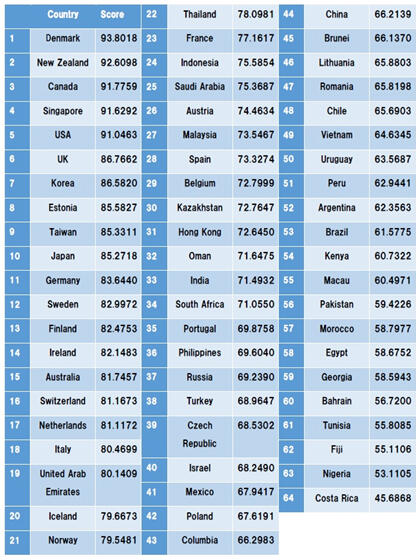The Institute of Digital Government, Waseda University (Research Director Atsushi Kato) has announced the 17th Waseda University World Digital Governance Rankings 2022. The top 10 in overall ranking are: 1st Denmark (last year: 1st), 2nd New Zealand (7th), 3rd Canada (5th), 4th Singapore (2nd), 5th United States (4th), 6th UK (3rd), 7th South Korea (8th), 8th Estonia (6th), 9th Taiwan (10th) and 10th Japan (9th). Denmark secured the top spot for the second year in a row, but other countries have shifted in order. Emeritus Professor of Waseda University Toshio Obi, the creator of the rankings, commented on this report, giving a warning. "The world's technological progress is striking, and gaps between countries are also widening in digital governance. Gaps are appearing in countries' ability to deliver administrative/financial reform and public services, between countries that are able to use advanced technology such as AI, 5G, Cloud and blockchain and countries that are not."
Waseda University's world digital governance rankings are research and analysis reports that carry out multifaceted assessments of the progress of digital governance, crucial to the lives of citizens, in 64 advanced ICT countries and regions using 10 key indicators: 1) Network Infrastructure Preparedness (NIP), 2) Management Optimization (MO), 3) Online Services (OS), 4) National Portal (NPR), 5) Government Chief Information Officer (GCIO), 6) Digital Government Promotion (EPRO), 7) E-Participation (EPAR), 8) Open Government Data & DX, (OGD) 9) Cybersecurity (CYB) and 10) The emerging technology in Digital government (EMG).

Provided by Waseda University
This year, the rankings reported initiatives concerning the warning and prevention systems of different governments targeted at rapidly increasing cybersecurity threats, as well as the rise and use of new digital technology in government activities, the prospects of sustainable growth in digital fields of the future, and gaps between digitally advanced nations and other nations, particularly with regard to Denmark, which has taken the top spot for the second year running.
In terms of issues to be solved in digital governance, the report included closing the digital innovation gap (Cloud, IoT, AI applications); responses to the aging societies in Japan and Europe, where aging societies are progressing rapidly; and the global standardization of open innovation, which crosses national borders.
On the other hand, it also summarized Japan's challenges and structural weaknesses, pointing out its vertically divided administration (exposed in its response to COVID-19), lack of digital transformation (DX) and sense of speed, complexity of decision-making due to the legal separation of the electronic administration (central) and electronic local governments (regional), and the increasing disparity between administrative/fiscal/digital services in prefectures and municipalities.
In addition, the report proposed priority matters in digital governance for Japan in the post-corona period. The first matter is measures needed for a future digital governance model, based on 17 years of time series analysis and evaluation analysis, and the application of historical lessons learned from the challenges posed to human society by steadily and rapidly growing technology.
The second involves promoting public-private partnerships and digital innovation by using digital technologies with a focus on the low birthrate, super-aging and population decline that the country faces; reducing costs and increasing efficiency in administrative and fiscal affairs; and driving measures that contribute to increased convenience in the everyday lives of citizens, based on a silver economy achieved through optimal and proactive digital investment.
The third is to determine a new, comprehensive roadmap for a digital innovation growth strategy in the post-corona era, based on the integrated power of the three major advanced technologies: 5G, AI and 8K.
Fourth is the provision of seamless, one-stop services by eliminating the legal separation of electronic administration (central) and electronic local governments (regional), and the construction of fifth-generation digital governance (advocated by the Institute of Digital Government) with information-sharing infrastructure at its heart based on the development and popularization of 5G/6G, and the use and application of AI and blockchain.
This article has been translated by JST with permission from The Science News Ltd. (https://sci-news.co.jp/). Unauthorized reproduction of the article and photographs is prohibited.




